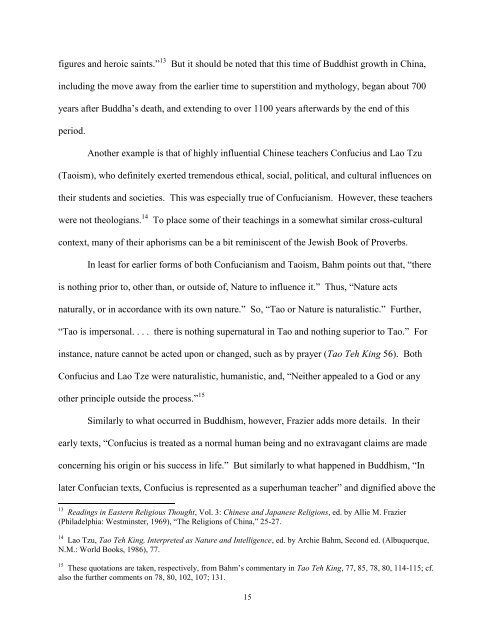Published by
299z7CN
299z7CN
Create successful ePaper yourself
Turn your PDF publications into a flip-book with our unique Google optimized e-Paper software.
figures and heroic saints.” 13<br />
But it should be noted that this time of Buddhist growth in China,<br />
including the move away from the earlier time to superstition and mythology, began about 700<br />
years after Buddha’s death, and extending to over 1100 years afterwards <strong>by</strong> the end of this<br />
period.<br />
Another example is that of highly influential Chinese teachers Confucius and Lao Tzu<br />
(Taoism), who definitely exerted tremendous ethical, social, political, and cultural influences on<br />
their students and societies. This was especially true of Confucianism. However, these teachers<br />
were not theologians. 14<br />
To place some of their teachings in a somewhat similar cross-cultural<br />
context, many of their aphorisms can be a bit reminiscent of the Jewish Book of Proverbs.<br />
In least for earlier forms of both Confucianism and Taoism, Bahm points out that, “there<br />
is nothing prior to, other than, or outside of, Nature to influence it.” Thus, “Nature acts<br />
naturally, or in accordance with its own nature.” So, “Tao or Nature is naturalistic.” Further,<br />
“Tao is impersonal. . . . there is nothing supernatural in Tao and nothing superior to Tao.” For<br />
instance, nature cannot be acted upon or changed, such as <strong>by</strong> prayer (Tao Teh King 56). Both<br />
Confucius and Lao Tze were naturalistic, humanistic, and, “Neither appealed to a God or any<br />
other principle outside the process.” 15<br />
Similarly to what occurred in Buddhism, however, Frazier adds more details. In their<br />
early texts, “Confucius is treated as a normal human being and no extravagant claims are made<br />
concerning his origin or his success in life.” But similarly to what happened in Buddhism, “In<br />
later Confucian texts, Confucius is represented as a superhuman teacher” and dignified above the<br />
13 Readings in Eastern Religious Thought, Vol. 3: Chinese and Japanese Religions, ed. <strong>by</strong> Allie M. Frazier<br />
(Philadelphia: Westminster, 1969), “The Religions of China,” 25-27.<br />
14 Lao Tzu, Tao Teh King, Interpreted as Nature and Intelligence, ed. <strong>by</strong> Archie Bahm, Second ed. (Albuquerque,<br />
N.M.: World Books, 1986), 77.<br />
15 These quotations are taken, respectively, from Bahm’s commentary in Tao Teh King, 77, 85, 78, 80, 114-115; cf.<br />
also the further comments on 78, 80, 102, 107; 131.<br />
15


